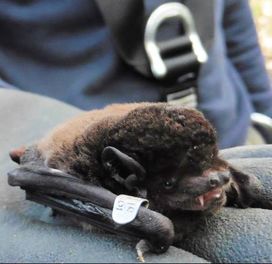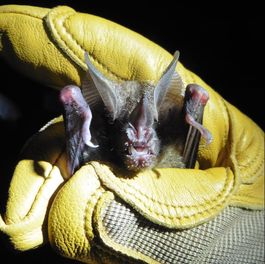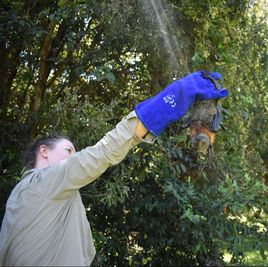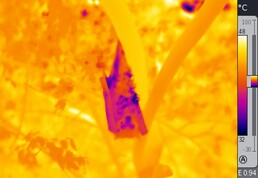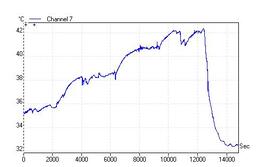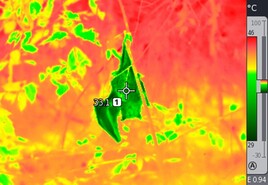Melissa Walker
- PhD Student, Lab of Animal Ecology, Hawkesbury Institute for the Environment, University of Western Sydney
- Topic: Flying-fox physiology and energetics
- Research Umbrellas: i) Flying-fox movement ecology, and ii) Flying-foxes and extreme heat events
Supervisors: Dr Christopher Turbill, Dr Jessica Meade, Prof Justin Welbergen - Contact: Melissa Walker
Bio
My interests are mammalian energetics and physiology. I graduated from La Trobe University, Melbourne, in 2015, with a Bachelor of Animal and Veterinary Biosciences. After having been involved with local groups (Melbourne bat box monitoring program, JABS Joey and Bat Sanctuary), I grew interested in bat ecology and current bat research.
I completed an honours year at La Trobe University, in 2016, with Gould's Wattled bat, Chalinolobus gouldii. Using open-flow respirometry and bomb calorimetry, we were able to observe pre and postprandial responses of C. gouldii to two meal sizes. Specifically we found BMR and AMR of their respective metabolic profiles. For their digestive energetics, we identified meal retention time, digestive efficiency and stomach capacity.
During 2017, I worked as an undergraduate laboratory demonstrator, while also taking on local research roles and one internal role. In June, 2017, I worked as a field assistant for a Harvard University PhD project, based in the Darién province, Panama. Here, our team worked on Serranía de Majé, at the Chucantí Nature Reserve, located in a highly biodiverse and isolated cloud forest. Primarily we sought to examine a hyperparasitic fungi associated with ectoparasitic flies on neotropical bats.
My interests are mammalian energetics and physiology. I graduated from La Trobe University, Melbourne, in 2015, with a Bachelor of Animal and Veterinary Biosciences. After having been involved with local groups (Melbourne bat box monitoring program, JABS Joey and Bat Sanctuary), I grew interested in bat ecology and current bat research.
I completed an honours year at La Trobe University, in 2016, with Gould's Wattled bat, Chalinolobus gouldii. Using open-flow respirometry and bomb calorimetry, we were able to observe pre and postprandial responses of C. gouldii to two meal sizes. Specifically we found BMR and AMR of their respective metabolic profiles. For their digestive energetics, we identified meal retention time, digestive efficiency and stomach capacity.
During 2017, I worked as an undergraduate laboratory demonstrator, while also taking on local research roles and one internal role. In June, 2017, I worked as a field assistant for a Harvard University PhD project, based in the Darién province, Panama. Here, our team worked on Serranía de Majé, at the Chucantí Nature Reserve, located in a highly biodiverse and isolated cloud forest. Primarily we sought to examine a hyperparasitic fungi associated with ectoparasitic flies on neotropical bats.
|
Research
Energetics is fundamental to animal ecology, and maintenance of a positive energy balance is presumed to be important to the behavior of flying-foxes. Current bio-logging technology allows researchers to monitor the energy costs of wild flying-foxes during resting and activity under natural environmental conditions. Thermoregulatory metabolism will be a large component of the daily energy budget of flying foxes, and its cost is determined by body mass, roosting behavior and environmental conditions. A reduction in body temperature while resting (i.e. torpor) is an important mechanism employed by smaller bats and many other mammals to reduce their daily energy requirements (e.g. when food is unavailable or foraging costs are high). Flying-foxes must also cope with exposure to extremely hot conditions, which can result in severe heat stress and even large-scale die-off events. The energy costs of activity are also important and recent advances in body acceleration sensing allow the annotation of spatial movement traces with energy costs associated with different behaviours in wild animals. This project will use these bio-logging methods to understand and predict how energetics affect the behavior and movements of flying-foxes over space and time. My PhD is supported by an ARC Discovery Project awarded to Dr Justin Welbergen, Dr Christopher Turbill and Dr David Westcott to develop a mechanistic understanding of the movement ecology of flying foxes. |
Publications
Walker MJ, Dorrestein A, Camancho JJ, Meckler LA, Silas KA, Hiller T, Haelewaters D. 2018. A tripartite survey of hyperparasitic fungi associated with ectoparasitic flies on bats (Mammalia: Chiroptera) in a neotropical cloud forest in Panama. Parasite 25, 19
Walker MJ, Dorrestein A, Camancho JJ, Meckler LA, Silas KA, Hiller T, Haelewaters D. 2018. A tripartite survey of hyperparasitic fungi associated with ectoparasitic flies on bats (Mammalia: Chiroptera) in a neotropical cloud forest in Panama. Parasite 25, 19

